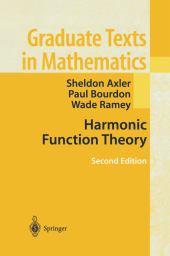 Neuerscheinungen 2010Stand: 2020-01-07 |
Schnellsuche
ISBN/Stichwort/Autor
|
Herderstra▀e 10
10625 Berlin
Tel.: 030 315 714 16
Fax 030 315 714 14
info@buchspektrum.de |

Sheldon Axler, Paul Bourdon, Ramey Wade
(Beteiligte)
Harmonic Function Theory
2nd ed. 2010. xii, 264 S. Illustr. 235 mm
Verlag/Jahr: SPRINGER, BERLIN 2010
ISBN: 1-441-92911-8 (1441929118)
Neue ISBN: 978-1-441-92911-2 (9781441929112)
Preis und Lieferzeit: Bitte klicken
This book is about harmonic functions in Euclidean space. This new edition contains a completely rewritten chapter on spherical harmonics, a new section on extensions of Bochers Theorem, new exercises and proofs, as well as revisions throughout to improve the text. A unique software package supplements the text for readers who wish to explore harmonic function theory on a computer.
Basic Properties of Harmonic Functions Bounded Harmonic Functions Positive Harmonic Functions The Kelvin Transform Harmonic Polynomials Harmonic Hardy Spaces Harmonic Functions on Half-Spaces Harmonic Bergman Spaces The Decomposition Theorem Annular Regions The Dirichlet Problem and Boundary Behavior Volume, Surface Area, and Integration on Spheres Harmonic Function Theory and Mathematica References Symbol Index Index
From the reviews of the second edition:
"There are several major changes in this second edition ... . Many exercises have been added and several photographs of mathematicians related to harmonic functions are included. The book is a nice introduction to the fundamental notions of potential theory." (European Mathematical Society Newsletter, June, 2002)
"We warmly recommend this textbook to graduate students interested in Harmonic Function Theory and/or related areas. We are sure that the reader will be able to appreciate the lively and illuminating discussions in this book, and therefore, will certainly gain a better understanding of the subject." (Ferenc Mˇricz, Acta Scientiarum Mathematicarum, Vol. 67, 2001)
"This is a new edition of a nice textbook ... on harmonic functions in Euclidean spaces, suitable for a beginning graduate level course. ... New exercises are added and numerous minor improvements throughout the text are made." (Alexander Yu. Rashkovsky, Zentralblatt MATH, Vol. 959, 2001)


